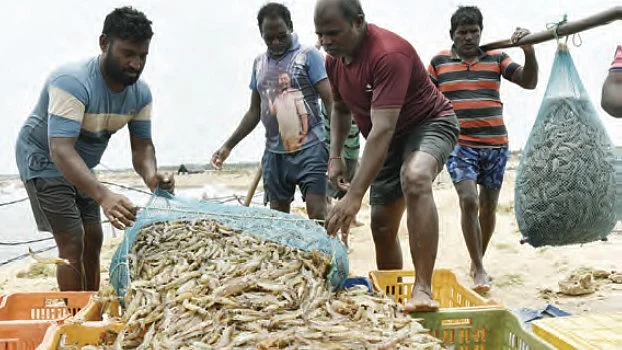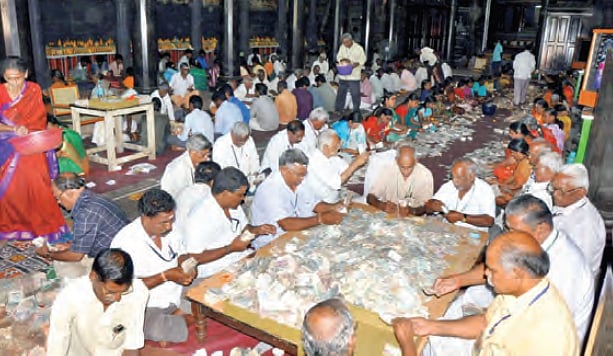Andhra Pradesh: Of tariff tantrums and temple theft
The Trump administration’s 60 per cent duty on Indian shrimp has hit Andhra's aqua farmers badly. Over 30 lakh people in the state are dependent on shrimp exports and allied activities

The new US tariff regime has thrown Andhra Pradesh’s thriving seafood economy into disarray. The state accounts for nearly 80 per cent of India’s total shrimp exports.
The Trump administration’s tariff tantrums—imposing nearly 60 per cent duty on Indian shrimp—have cost the state an estimated Rs 25,000 crore, with over 50 per cent of export orders reportedly cancelled. What began as a global trade recalibration has now turned into a local crisis, impacting not just exporters but also lakhs of workers and families involved in shrimp farming and allied industries.
Andhra Pradesh accounts for 34 per cent of India’s marine exports valued at around Rs 21,246 crore annually with over 30 lakh people dependent on shrimp exports and related activities. In the face of this growing crisis, chief minister N. Chandrababu Naidu, a key ally of the BJP-led NDA government at the Centre, has written to Union finance minister Nirmala Sitharaman, commerce and industry minister Piyush Goyal and fisheries minister Rajeev Ranjan Singh, seeking relief from Goods and Services Tax (GST) and a financial package for the state’s aqua farmers.
Naidu has also asked the Centre to facilitate bank support for exporters and aqua companies—including a 240-day moratorium on loan and interest repayments, interest subsidies and a temporary waiver of the 5 per cent GST on frozen shrimp.
In addition, he urged the Centre to focus on diversifying export markets beyond the US by pursuing Free Trade Agreements (FTAs) with the European Union, South Korea, Saudi Arabia and Russia. He also sought interim financial support for exporters, clarity on tariff/tax relief schemes while mentioning that exporters were ready to supply seafood to the European Union.
With export uncertainty mounting, shrimp farmers have started redirecting their harvest to domestic consumers. Local markets in Vijayawada, Eluru, Bhimavaram, Machilipatnam and other coastal towns are witnessing a glut of shrimp, often sold directly by farmers or through middlemen at substantially reduced prices.
This diversion may provide temporary relief, but the domestic market cannot absorb the sheer volume of international-grade produce cultivated in the state. The sudden export collapse could have ripple effects far beyond the coast, from processing units in the hinterland to banking institutions financing the aquaculture sector.
Unholy twists and turns
Even as Andhra’s economy grapples with international pressures, the political scene in the state is being rocked by a scandal at one of India’s holiest shrines.
Perched atop the Tirumala hills in Tirupati, the Venkateswara Swamy temple is at the centre of a bizarre case involving a heady mix of faith, crime and politics. What was essentially a theft case, involving an employee, has taken intriguing twists and turns with allegations of a well-oiled mechanism of insiders at work.
The plot has thickened with political parties wading into the controversy. A recent order by the Andhra Pradesh High Court for a fresh CID probe has put the spotlight on a twoyear- old case—dubbed as the ‘Parakamani scam’—allegedly involving the theft of foreign currency and jewellery worth over Rs 100 crore from the temple’s sacred collection box where devotees drop their offerings.

The ‘Parakamani’ process refers to a sacred ritual at the Tirumala temple where offerings of cash, gold and valuables are meticulously counted and segregated. It involves hundreds of staff of the Tirumala Tirupati Devasthanams (TTD), bank officials and volunteers who keep an account of the offerings. The counting process has been under CCTV surveillance since 2012.
The case dates back to 19 April 2023, when C.V. Ravi Kumar, a volunteer, was caught concealing Rs 9 lakh during routine frisking by security personnel. However, the FIR at Tirumala One Town police station recorded only Rs 72,000 as the amount recovered.
Further investigations revealed that Kumar had allegedly been stealing for several years, amassing immovable properties worth up to Rs 100 crore in Tirupati and Chennai. In another bizarre twist, on 19 May 2023, weeks after his arrest, Kumar and his wife donated seven properties, valued at Rs 40 crore, to TTD “out of pure devotion”.
A chargesheet was filed on 30 May 2023 in the second additional judicial magistrate court in Tirupati. What followed defied both logic and ethics. In September 2023, Kumar and assistant vigilance and security officer (AVSO) Y. Satish Kumar, who had frisked him, told the Tirupati Lok Adalat that a settlement had been reached.
As a result, charges against Kumar were quashed without a conviction, ostensibly in exchange for the donated assets. Satish Kumar later revealed that he was under “extreme pressure” from higher-ups in the police department to reach an agreement.
A December 2024 TTD vigilance report later confirmed that undue pressure had been applied to close the case quietly. In another twist to the case, a local resident, M. Sreenivasulu, filed a writ petition on 9 September challenging the validity of the Lok Adalat settlement.
The Andhra Pradesh High Court took suo motu cognisance of the matter and on 20 September, suspended the Lok Adalat order of September 2023. “TTD cannot act arbitrarily as a mere custodian,” the order emphasised, directing the CID to probe the theft, the compromise and the extent of the conspiracy.
The bench further noted that the donated properties worth Rs 40 crore paled against the scam’s estimated scale of Rs 100 crore. While observing that reopening the case could expose “hidden stakeholders”, the court ordered seizure of all related records and ordered the CID to file a sealed report by 13 October.
The political fallout has been swift with the ruling Telugu Desam Party and the opposition YSRCP trading charges. Chandrababu Naidu is considering setting up an SIT (Special Investigation Team) to probe the matter. His son and the state IT minister Nara Lokesh said, “Several people are involved in the racket. Their names must come out.” .
He accused the previous YSRCP government—which was in office when the incident came to light—of orchestrating a cover-up and alleged that the accused was let off after perfunctory questioning under Section 41A of the CrPC. He charged the previous government of eroding the sanctity of the Tirumala temple.
The opposition has responded in kind. The YSRCP MP from Tirupati, Maddila Gurumoorthy, has written to Union home minister Amit Shah and the Chief Justice of India seeking a CBI probe and a judicial commission headed by a sitting Supreme Court judge.
He said the TDP government’s allegations of theft were nothing but political vendetta and warned that weaponising ‘Parakamani’ for partisan politics would damage harmony and erode public trust in temples. With the state at the intersection of global trade wars, domestic economic fragility and political score-settling, Naidu, a seasoned administrator faces a serious test.
Follow us on: Facebook, Twitter, Google News, Instagram
Join our official telegram channel (@nationalherald) and stay updated with the latest headlines
